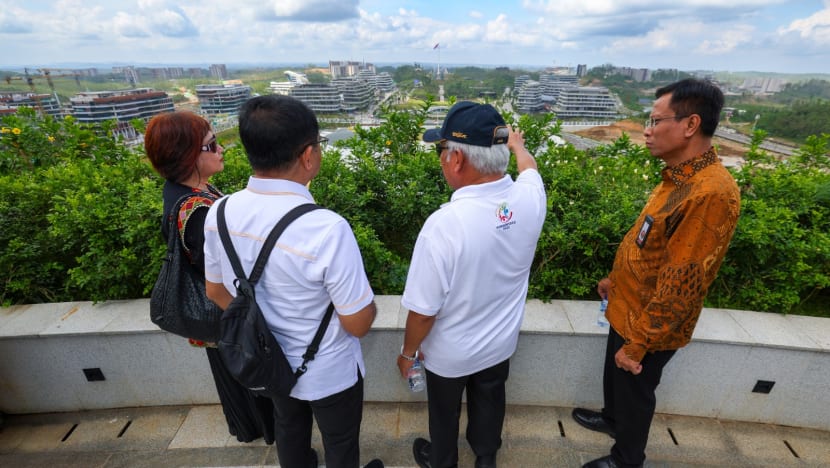World
Indonesia’s New Capital Faces Uncertainty as Prabowo Delays Plans

Indonesia’s plans to relocate its capital to Nusantara are facing growing skepticism following President Prabowo Subianto‘s recent decision to hold the country’s Independence Day ceremony in Jakarta rather than the new site. Observers are questioning the future of Nusantara, especially as Prabowo has not yet issued a crucial decree to formalize the capital transfer, raising concerns about investor confidence and political ramifications ahead of the 2029 presidential election.
In August 2022, Nusantara welcomed its first Independence Day celebration, showcasing ongoing construction efforts in a city designed to alleviate the chronic congestion, pollution, and flooding that plague Jakarta. However, the upcoming ceremony on August 17, 2024, will revert to the familiar grounds of Jakarta’s Merdeka Palace, underscoring the current lack of urgency surrounding the capital relocation.
Political analysts note that Prabowo’s hesitance may create tensions with his predecessor, Joko Widodo, who championed the relocation as a remedy for Jakarta’s myriad issues. Observers suggest that the president’s inaction could alienate key supporters and undermine public confidence in the project, which has already been a subject of controversy since its inception.
Challenges and Controversies Surrounding Nusantara
The idea to move Indonesia’s administrative center was first proposed by Widodo in 2019, citing Jakarta’s unsustainable living conditions. He envisioned Nusantara as a modern city free from natural disasters, strategically located in East Kalimantan to better distribute economic growth across the archipelago. Despite the ambitious goals, the project has faced significant resistance from various quarters, including environmentalists, indigenous communities, and civil servants reluctant to relocate.
A 2019 survey revealed that a staggering 94 percent of public employees preferred to resign rather than move to Nusantara. Critics have raised alarms about the potential environmental impact on Kalimantan’s rich rainforest ecosystem and questioned the feasibility of investing billions into a project lacking widespread public endorsement.
Indonesia’s government passed a law in 2022 to guide the capital’s construction and management. Yet, the timeline for the transfer remains vague, contingent on a presidential decree that has yet to be signed, despite expectations following Prabowo’s inauguration in October 2023.
According to Siti Zuhro, a political expert at the Indonesian Research and Innovation Agency (BRIN), Prabowo appears to be prioritizing other initiatives aimed at building economic resilience, which may explain his lack of urgency regarding Nusantara. His administration has set ambitious goals, including establishing 80,000 cooperatives in rural areas and implementing a free meal program, with a total estimated cost of $32 billion.
Investor Confidence in Jeopardy
The financial implications of Prabowo’s initiatives have diverted attention and resources away from the Nusantara project. Between 2022 and 2024, Widodo allocated 89 trillion rupiah (approximately $5.5 billion) for the capital’s development, while Prabowo has committed only 48.8 trillion rupiah (around $3.1 billion) for the period from 2025 to 2029.
The government has paused funding for the capital project amid Prabowo’s austerity measures, raising further doubts about the project’s viability. Recently, members of Prabowo’s coalition, including the National Democratic Party (NasDem), have urged clarity on the capital’s future. They have called for either an expedited issuance of the relocation decree or a complete suspension of the project.
In a parliamentary session on July 30, Basuki Hadimuljono, head of the Nusantara Capital Authority, reported that construction has progressed to “phase one,” which includes essential infrastructure and government buildings. However, the absence of significant private investment remains a critical obstacle. As of April, only 42 companies had agreed to invest in Nusantara, pledging $3.8 billion in development.
Concerns persist over the need for a formal commitment from the government to ensure investor confidence. Djayadi Hanan, executive director of the Indonesian Survey Institute, emphasized that investors require assurances that the capital transfer will proceed as planned. The absence of a decree or increased government investment could deter potential backers.
As Indonesia proceeds with its plans, the recent deployment of the KHAN short-range ballistic missile system in East Kalimantan signals the government’s commitment to securing the area. While the connection to the capital move remains unconfirmed, experts view this as a positive development for the future of Nusantara.
Political observers suggest that delays in the capital relocation could weaken Prabowo’s standing with both his predecessor and his political coalition. Maintaining proximity to Jakarta’s political elite is vital for Prabowo, especially as he prepares for a potential re-election campaign in 2029. Balancing the expectations of his supporters and the demands of his coalition presents a complex challenge.
As discussions about Nusantara continue, the coming years will be crucial in determining whether it transforms into Indonesia’s new capital or becomes a neglected “ghost town.” The political landscape and public sentiment will largely shape the outcome in this pivotal moment for the nation.
-

 Business5 months ago
Business5 months agoKenvue Dismisses CEO Thibaut Mongon as Strategic Review Advances
-

 Lifestyle4 months ago
Lifestyle4 months agoHumanism Camp Engages 250 Youths in Summer Fest 2025
-

 Sports4 months ago
Sports4 months agoDe Minaur Triumphs at Washington Open After Thrilling Comeback
-

 Sports5 months ago
Sports5 months agoTupou and Daugunu Join First Nations Squad for Lions Clash
-

 Top Stories5 months ago
Top Stories5 months agoColombian Senator Miguel Uribe Shows Signs of Recovery After Attack
-

 World5 months ago
World5 months agoASEAN Gears Up for Historic Joint Meeting of Foreign and Economic Ministers
-

 Health4 months ago
Health4 months agoNew Study Challenges Assumptions About Aging and Inflammation
-

 Business5 months ago
Business5 months agoOil Prices Surge Following New EU Sanctions on Russia
-

 Entertainment4 months ago
Entertainment4 months agoDetaşe-Sabah Violin Ensemble Captivates at Gabala Music Festival
-

 Entertainment4 months ago
Entertainment4 months agoBaku Metro Extends Hours for Justin Timberlake Concert
-

 Top Stories5 months ago
Top Stories5 months agoRethinking Singapore’s F&B Regulations Amid Business Closures
-

 Business5 months ago
Business5 months agoU.S. House Approves Stablecoin Bill, Sends to Trump for Signature









